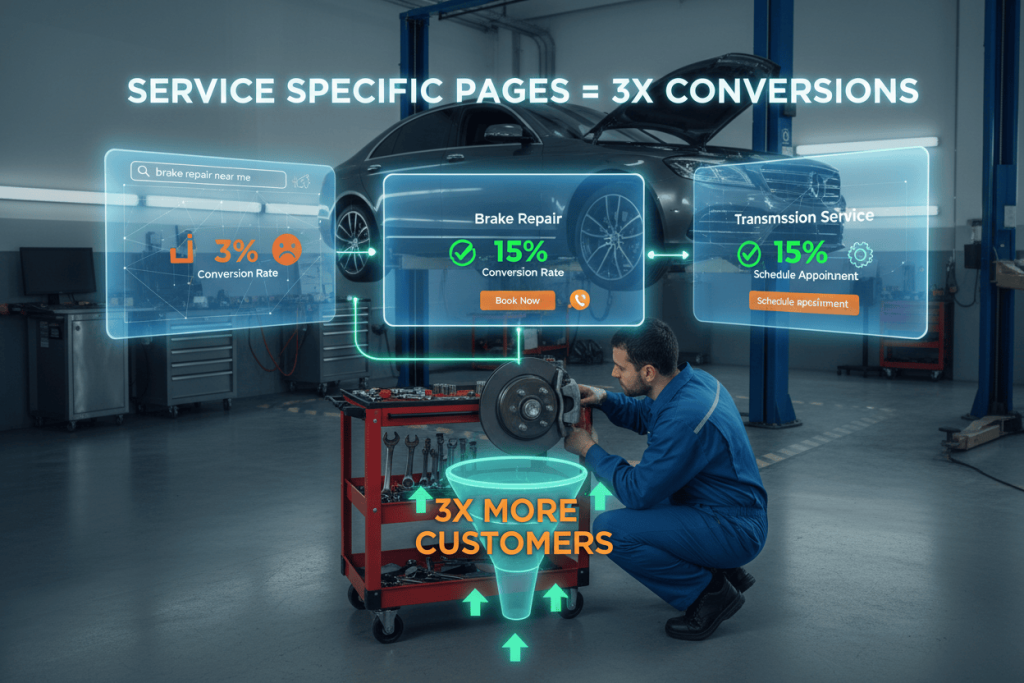Service-Specific Landing Pages Convert 3x More Searchers Into Customers for Auto Shops

Your auto repair shop website has a homepage, an “About Us” page, and maybe a “Services” page that lists everything you do—oil changes, brakes, transmission, diagnostics, engine repair.
When someone clicks your Google ad for “brake repair,” they land on your homepage or generic services page and have to hunt for brake-specific information. Meanwhile, your competitor’s site sends brake repair searchers to a dedicated page that only talks about brake services, explains their brake repair process, shows brake-specific photos, and lists brake service pricing.
Guess which shop gets more calls from the same amount of traffic? By the end of this article, you’ll understand why service-specific landing pages convert at triple the rate of generic pages and which services justify their own dedicated pages.
Contents:
Matching Search Intent Eliminates Friction
When someone searches “transmission repair near me” and clicks your ad or search result, they have one question: can you fix their transmission problem? They don’t care about your oil change services, your alignment equipment, or your shop’s history. They want transmission-specific information—fast.
A generic services page forces them to scroll, click through sections, or navigate to find transmission information. Every extra step is friction that gives them opportunity to leave and check your competitor’s site. A dedicated transmission landing page immediately confirms you handle transmission repair, shows relevant photos, explains your diagnostic process, and provides clear next steps to book service.
This immediate relevance transforms conversion rates. When we audit auto shop websites, we consistently see service-specific pages convert 3-4x better than generic services pages—same traffic, same offer, just better message-to-market match.
Google also rewards this relevance. When your brake repair ad leads to a page exclusively about brake services, Google views that as better user experience and improves your Quality Score, which lowers your ad costs. Service-specific pages benefit both SEO (organic search) and paid search performance.
The Five Services That Need Dedicated Pages
Not every service justifies a standalone page. Focus on services that meet these criteria: high search volume, high revenue per job, or high frequency customer requests.
- Brake services: One of the highest-volume searches in auto repair. Include brake pad replacement, rotor resurfacing, brake fluid flush, and common brake problems you diagnose.
- Transmission repair: High-value service with specific search intent. Cover transmission diagnostics, rebuild vs. replacement decisions, and what transmission problems you handle.
- Check engine light diagnostics: Extremely high search volume and typically the entry point for additional repair work. Explain your diagnostic process and common issues you identify.
- Oil change and maintenance: High frequency but lower margin—still worth a dedicated page because it builds customer relationships that lead to larger repairs.
- Specific vehicle type services: If you specialize in European vehicles, diesel trucks, or hybrid/electric cars, create dedicated pages that speak to those vehicle owners’ specific needs.
At Element DMA, whenever we build websites for auto repair shops, we create service-specific landing pages for their top 5-7 revenue-generating services rather than a single “Services” page. The improved conversion rates typically pay for the entire website within 90 days.
What Makes These Pages Convert
Service-specific headlines: “Expert Brake Repair in [City]” immediately confirms relevance, while “Auto Services” creates doubt about whether you actually do brake work.
Process explanation: Walk through what happens when a customer brings their vehicle in for this specific service. Transparency builds trust and reduces anxiety about cost and time.
Pricing transparency: Even ranges like “$150-$350 for brake pad replacement” help customers self-qualify and reduce price-shopping calls. Avoid “call for quote” as the only pricing option.
Before/after photos: Real photos of brake rotors, transmission components, or engine repairs specific to this service prove you regularly perform this work.
Clear call-to-action: Every service page needs obvious next steps—phone number prominently displayed, click-to-call button on mobile, and online booking if you offer it.
What You Can Do
- Create dedicated landing pages for your top 5 highest-revenue or highest-volume services
- Write service-specific headlines and content for each page rather than copying generic text
- Include your service process, typical pricing ranges, and real photos of that type of work
- Add clear calls-to-action with phone number, click-to-call, and booking options
- Connect your Google Ads campaigns to relevant service pages instead of your homepage
The Bottom Line
Generic pages make visitors work to find what they’re looking for. Service-specific pages immediately confirm you provide the service they need and explain exactly how you’ll solve their problem. That reduction in friction and increase in relevance directly translates to more phone calls and more booked jobs from the same traffic.
Most auto repair shop websites still use a single “Services” page that lists everything they do. The shops converting traffic at the highest rates have dedicated pages for each major service that match search intent precisely.
All the auto repair shops that work with us at Element DMA have service-specific landing pages for their top revenue services, with clear CTAs and process explanations that convert traffic into customers. Once you create dedicated pages for your key services, you can expect conversion rates to double or triple compared to generic service pages.